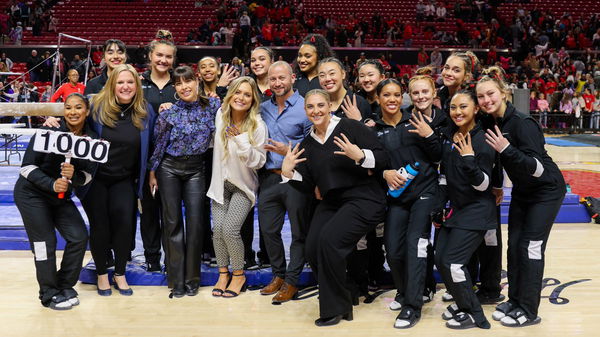

Yet another day in college gymnastics and yet another victory for the UCLA Bruins. This time the Bruins had to take the battle in their first home conference in Pauley Pavilion against No. 26 Illinois. And they showed what they could do that. In front of 7,647 in the box, the Bruins put up a mammoth score of 197.200. However, in reply, the guests posted only 194.750.
Watch What’s Trending Now!
It could never be sufficient against a squad that had Jordan Chiles in the lineup. Just like the other day against Maryland, the Olympian shone brightly in the floor exercise. No, a perfect 10 didn’t come this time (January 25). But what came was enough to raise a question.
Chiles led the charge this time with a 9.95 in floor exercise. Just 0.05 away from the perfect 10. A similar scene unfolded in the vault event as well. Jordan and another Trojan, Chae Campbell, dropped 9.925 each. A fraction more and the duo could have registered the joint perfect ten in the night. Don’t such scores hurt the gymnasts? As per the revised NCAA scoring policy, the scanner is tougher now. But the gymnasts are at the receiving end of this. But how do the Trojans feel about this?
ADVERTISEMENT
Jordan Chiles’s teammates seem on the same page
In the post-match press conference, Emma Malabuyo and Chae Campbell appeared to take the questions. As expected, questions related to the new scoring system were also thrown at the duo. Fortunately, both gymnasts were well aware of the situation. And they had some good takes on it. In fact, just before the press meet, Emma had scored 9.900 on the balance beam. She followed this with a season-high 9.925 in floor exercise. Campbell wasn’t much behind either, as she also hit a 9.850 on the floor routine.
By the end, Campbell also had the all-around title in the match. Surely such massive numbers on the mat would put a smile on their faces. But they were also pretty bothered about the new NCAA gymnastics policy. They could have been handed perfect 10s in those routines in the absence of such rules. So, was there anything for them to share?
ADVERTISEMENT

ADVERTISEMENT
Emma Malabuyo took the question first. The senior didn’t show any bitter emotion about the rule. Rather, she said, “I think with this new scoring system I really try not to focus on any of the scores or try to look at them and I just focus on like what is in my control and I think of like all my little cues beforehand instead of like thinking about this.”
Top Stories
LIV Golf CEO Breaks Silence as Brooks Koepka Exits Before Contract Expiry

PGA Tour Drops Cryptic Brooks Koepka Statement as He Exits LIV Golf After 3 Years

Steelers Confirm $45M Punishment for DK Metcalf After NFL Suspended WR for 2-Games

NFL Suspends Chargers’ Denzel Perryman for Two Games Over Cowboys Incident

Clark Hunt Admits Being Pressured to Leave Arrowhead After Chiefs Offered $2.4B Proposal

$106.5M Blue Jays Star’s Future Turns Rocky as Ross Atkins Told to Hijack Red Sox’s Gold Glove Target

The Filipino, on the other hand, seemed to have a list of do’s and don’ts. And in that list, thinking about the scoring policy comes in the don’ts quota. “I just focus on again, like what is in my control and like what can I do in this moment,” she added in the end. Chae Campbell had almost similar thinking.
ADVERTISEMENT
In the press conference, the 5’7” graduate said, “It doesn’t change what I’ve been training leading up to it so I feel like I’ve been stronger mentally this season where nothing like outside can really affect my performance.” She thanked her leadership training for refining her thought process on it. Did Jordan Chiles concede something? No, the Olympian has yet to claim anything about it. But what is the actual scenario? What issues were stirring the pot?
The complications in college gymnastics continue
This season, only two gymnasts have amassed a perfect 10 in their routines. Jordan Chiles is one of those two names. Apart from this duo’s scores, several have reached near-perfect 10s, but not the perfect one. Haleigh Bryant, the defending NCAA all-around champion, has yet to land a perfect ten. But what exactly is the reason behind all these near-misses?
ADVERTISEMENT
Well, in May 2024, the Women’s Collegiate Gymnastics Association (WCGA) initiated the Collegiate Judging Issue, and by August, they appointed Jennifer Sampson as the head of officials. The moves kicked off a new dawn in the scoring policy of college gymnastics. How? Sampson’s role includes managing the newly established Standardized Consistency in the Officiating of Routine Evaluation Board (widely regarded as SCORE). The objective of this board is to challenge judges. It would keep an eye on how they evaluate each routine and the accuracy of their decisions. And what will be the advantage of it?

ADVERTISEMENT
After analyzing the data from individual assessments, SCORE will draw the judges’ future. First, the rankings will come. Those rankings will influence the judges’ postseason assignments. How? SCORE’s evaluation will help the NCAA committee dictate the assignments. Now comes the crunchy one.
The 2025 season is planned to serve as the trial period for this new policy, so judges should be prepared to deliver their best work with more accurate criteria and a keener focus on error-free evaluations. Those facts make the situation a test for all, and they are on the same page now. Aren’t they?
ADVERTISEMENT
ADVERTISEMENT
ADVERTISEMENT
ADVERTISEMENT

